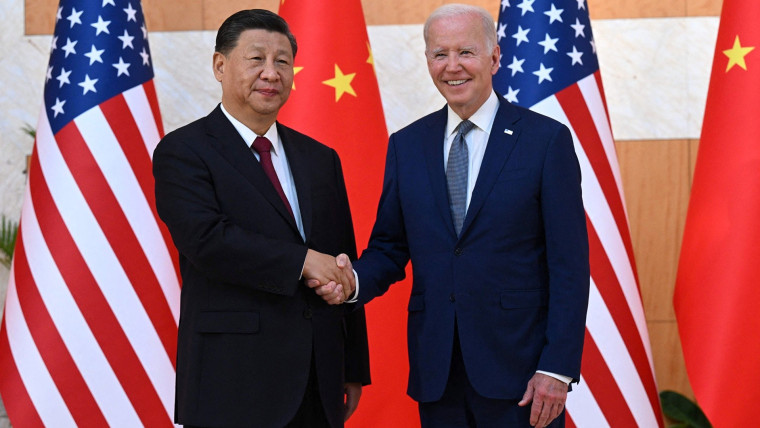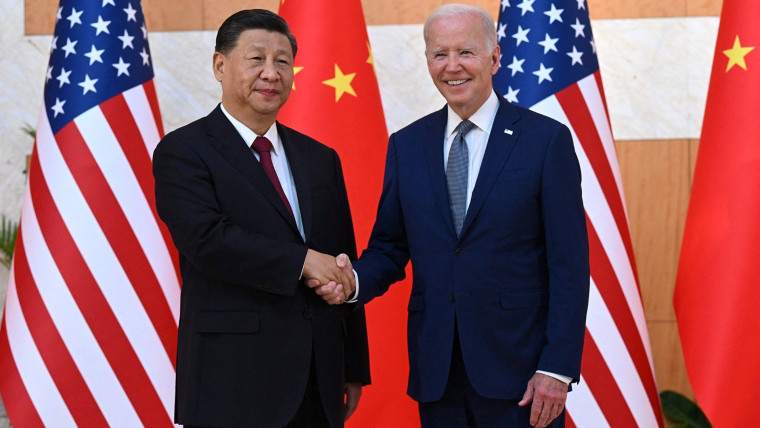BEIJING — Now that he has consolidated power at home, Chinese President Xi Jinping is stepping out onto the world stage to strengthen relations with the U.S. and other countries.
In all, Xi has met with more than 25 heads of state — including President Joe Biden — since Oct. 31, according to a CNBC count of official readouts on the Chinese Foreign Ministry’s English-language website.
Most recently, Xi hosted European Council President Charles Michel in Beijing on Thursday. That followed a visit in early November by German Chancellor Olaf Scholz, the first Western leader to do so since before the coronavirus pandemic.
In October, Xi oversaw a leadership reshuffle of the ruling Chinese Communist Party that packed top positions with his loyalists and paved the way for him to gain an unprecedented third term as president. In a speech at the party congress, Xi said the party has “safeguarded China’s dignity” in the face of international changes and warned of “dangerous storms” ahead.
Xi had spent the entire pandemic in China until September, when he made a state visit to Kazakhstan and then traveled to Uzbekistan for a regional summit where he met with Russian President Vladimir Putin.
Xi is “coming out more and engaging more with the international community,” said Michael Cunningham, a research fellow at the Heritage Foundation’s Asian Studies Center who focuses on Chinese policy. “That will be a challenge for the U.S.”
Cunningham said U.S. efforts to build overseas coalitions have been helped by Xi’s absence from the international stage for much of the last three years.
The meetings come after the Russia-Ukraine war and Covid restrictions on travel have pushed Beijing and the West apart. U.S.-China relations were further strained last summer over House Speaker Nancy Pelosi’s visit to Taiwan, a self-ruling island Beijing claims as its territory.
Many of Xi’s bilateral meetings with world leaders, including the one with Biden, took place on the sidelines of the Group of 20 summit on the Indonesian island of Bali last month.
“He met with leaders of advanced industrial democracies for the first time since the pandemic began and amid fraught relations between China and the West,” Eurasia Group analysts said in a Nov. 18 report. “Most of Xi’s meetings fueled a positive outlook for stabilizing relations.”
In a moment at the G-20 summit that drew global attention, Xi was captured on camera rebuking Canadian Prime Minister Justin Trudeau over alleged leaks to the media from an informal conversation they had had a day earlier. The two leaders did not have an official bilateral meeting.
Xi’s Nov. 14 bilateral meeting with Biden, their first in person since the U.S. president took office in January 2021, signaled a pause in this year’s downward spiral of relations between the world’s two largest economies. The following week, the countries’ military leaders met for the first time since Pelosi’s controversial Taiwan visit in August.
The high-stakes Xi-Biden meeting signaled to some in China that relations with the U.S. were aligning more with vague terminology that Beijing often uses, such as “mutual respect” and “win-win cooperation.”
“For China, the wording carries some token symbolism, that is equality,” said Shen Yamei, deputy director and associate research fellow at state-backed think tank China Institute of International Studies’ department for American studies. “We need to handle our relations on equal footing, by respecting each other and win-win cooperation, rather than, as the U.S. said, the U.S. is dealing with others from a position of strength. That’s not equal.”
Shen said China and the U.S. can work together more easily on issues like climate change, public health and macroeconomic coordination. She said “it will be a little bit difficult on issues more concerned with traditional security issues, like our understanding of the Ukraine crisis and the way to work [it] out.”
“The important thing is we [keep] in mind the responsibility of a major country to the world by cooperating with each other,” she said.
The Biden administration has called China a competitor, while strengthening U.S. ties with other countries, especially in the Indo-Pacific.
Heads of Japan, South Korea, Australia, Indonesia and Italy met with both Xi and Biden in the last several weeks, based on government announcements.
“Right now the political environment in China is different,” Cunningham said. Xi “is trying to get relationships back on the right track so that the conditions are positive for China.”
“The way China sees it, the right track and positive conditions is where the world’s most powerful countries, the U.S., Western Europe, some of the East Asian countries, are not actively opposing China’s rise as a global power,” he said. “That was the track we were on largely before 2018, when U.S.-China trade tensions really boiled over.”





